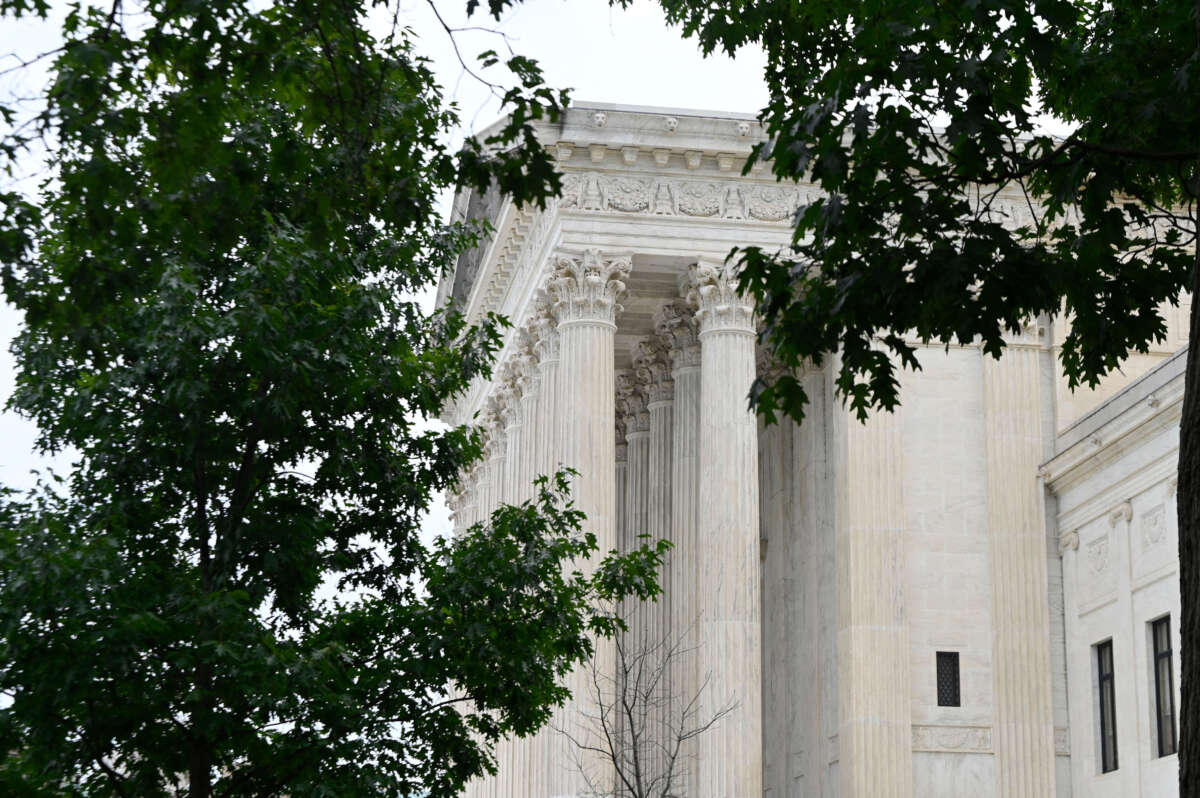Honest, paywall-free news is rare. Please support our boldly independent journalism with a donation of any size.
On Friday, the Supreme Court is slated to rule on what could be a devastating case for LGBTQ rights based on what appear to be completely illegitimate claims for standing — including evidence filed by anti-LGBTQ petitioners who appear to have used a real man’s identity to make up a fake gay couple whole cloth.
The case, 303 Creative v. Elenis, involves Lorie Smith, a self-proclaimed wedding website designer who has never designed a wedding website and who claims that Colorado laws prohibiting businesses from refusing to sell a product to gay people are trampling on her free speech as someone who opposes same-sex marriage. She says that she would hypothetically like to be a wedding website designer through her company 303 Creative, but is prevented from doing so due to the possibility of being requested to design a website for a gay couple — a premise with already questionable legal standing.
As part of the evidence for her case, Smith and her attorneys from right-wing, SPLC-designated hate group Alliance Defending Freedom (ADF) filed an email from a purported gay couple, Stewart and Mike, who they said asked Smith to do some design work for their upcoming wedding. ADF had presented this request as a key piece of evidence supporting Smith’s case when they filed it in 2017.
“My name is Stewart and my fiancee[sic] is Mike,” it reads. “We are getting married early next year and would love some design work done for our invites, placenames, etc. We might also stretch to a website.”
But Stewart and Mike, a journalist recently found, are not a real couple.
This week, using the phone number provided in the case, The New Republic’s Melissa Gira Grant called Stewart, the person who purportedly submitted the request, along with a URL to his own design website.
Grant found that Stewart is, indeed, a man named Stewart. And the address, phone number, email address, and design website listed on the email now in evidence in the Supreme Court do belong to him.
But Stewart isn’t in a partnership with a man named Mike. At the time the request was made in 2016, Stewart was married to a woman, and is still married to a woman. He has never even heard of 303 Creative. Despite his role as a piece of evidence in a Supreme Court case that could open the way for private businesses to discriminate against people based on their sexual orientation — evidence that Smith said in a sworn statement was true — Stewart’s lived experience does not line up with what court evidence claims he has experienced.
The phone call was “the very first time I’ve heard of” the inquiry to 303 Creative, Stewart told Grant. “I’m married, I have a child — I’m not really sure where that came from? But somebody’s using false information in a Supreme Court filing document,” he continued. He also questioned the logic of the inquiry — why, if he himself is a website designer, would he want to hire 303 Creative to make a website? (And, for his part, Stewart also said that he “disagree[s]” with ADF and Smith’s anti-LGBTQ stance “in the strongest possible terms.”)
Even before this, the email itself was under scrutiny, despite ADF arguing that it proved that “any claim that Lorie will never receive a request to create a custom website celebrating a same-sex ceremony is no longer legitimate.”
First is the assumption that one would be able to intuit that Stewart and Mike are a gay couple just based on the request. ADF argued that it is exceedingly unlikely that there are women named “Stewart” or “Mike” — but even so, the request says that Mike is Stewart’s “fiancee,” a term commonly used for a woman.
Second, the hypothetical Stewart hasn’t even asked for a website. “We might also stretch to a website,” is not a request for a website.
As long as Stewart is telling the truth, the standing for Smith’s case is even shakier than previously understood.
Smith and ADF are arguing that, if Smith were to someday choose to become a wedding website designer — which she has not chosen to do up until this point — she may be asked to design a website for a gay couple, as evidenced by this request from a gay couple that appears to be made up and who didn’t even request a website to begin with. This is such a potential violation of Smith’s freedoms that it apparently warrants being heard by the Supreme Court.
Despite justices having to essentially speculate how an interaction between Smith and a gay couple would happen, and whether, as Smith and ADF argue, the entirely imagined scenario would constitute an ongoing violation of her rights, the Supreme Court appears to be ready to rule in Smith’s favor, potentially eroding the rights of millions of gay people across the country.
Media that fights fascism
Truthout is funded almost entirely by readers — that’s why we can speak truth to power and cut against the mainstream narrative. But independent journalists at Truthout face mounting political repression under Trump.
We rely on your support to survive McCarthyist censorship. Please make a tax-deductible one-time or monthly donation.
